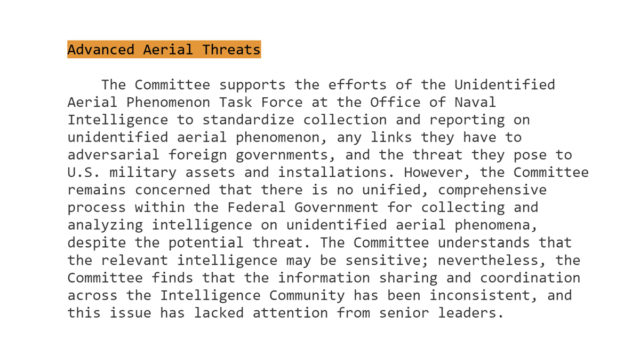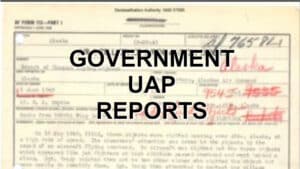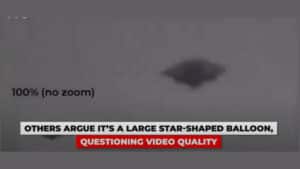The Intelligence Authorization Act For The Fiscal Year 2021 contains an ultimatum for the government to issue a report on Unidentified Aerial Phenomenon (UAP) in no less than 180 from the time of signing.
If you haven’t heard, slipped into the bills that Trump signed in 2020 is a passage in H.B. 7856 that the Unidentified Aerial Phenomenon Task Force has 180 days to put together a comprehensive report on Unidentified Aerial Phenomenon (UAP) to be released to the public, with some classified annexes of course.
Govt Forms the Unidentified Aerial Phenomenon Task Force
I had to do some digging to find the passages relating to the government disclosure of UFO activity so thought I would share it here.
Full Text of the Passage on Advanced Aerial Threats
Advanced Aerial Threats
The Committee supports the efforts of the Unidentified
Aerial Phenomenon Task Force at the Office of Naval
Intelligence to standardize collection and reporting on
unidentified aerial phenomenon, any links they have to
adversarial foreign governments, and the threat they pose to
U.S. military assets and installations. However, the Committee
remains concerned that there is no unified, comprehensive
process within the Federal Government for collecting and
analyzing intelligence on unidentified aerial phenomena,
despite the potential threat. The Committee understands that
the relevant intelligence may be sensitive; nevertheless, the
Committee finds that the information sharing and coordination
across the Intelligence Community has been inconsistent, and
this issue has lacked attention from senior leaders.
Therefore, the Committee directs the DNI, in consultation
with the Secretary of Defense and the heads of such other
agencies as the Director and Secretary jointly consider
relevant, to submit a report within 180 days of the date of
enactment of the Act, to the congressional intelligence and
armed services committees on unidentified aerial phenomena
(also known as ``anomalous aerial vehicles''), including
observed airborne objects that have not been identified.
The Committee further directs the report to include:
1. A detailed analysis of unidentified aerial
phenomena data and intelligence reporting collected or
held by the Office of Naval Intelligence, including
data and intelligence reporting held by the
Unidentified Aerial Phenomena Task Force;
2. A detailed analysis of unidentified phenomena data
collected by:
a. geospatial intelligence;
b. signals intelligence;
c. human intelligence; and
d. measurement and signals intelligence;
3. A detailed analysis of data of the FBI, which was
derived from investigations of intrusions of
unidentified aerial phenomena data over restricted
United States airspace;
4. A detailed description of an interagency process
for ensuring timely data collection and centralized
analysis of all unidentified aerial phenomena reporting
for the Federal Government, regardless of which service
or agency acquired the information;
5. Identification of an official accountable for the
process described in paragraph 4;
6. Identification of potential aerospace or other
threats posed by the unidentified aerial phenomena to
national security, and an assessment of whether this
unidentified aerial phenomena activity may be
attributed to one or more foreign adversaries;
7. Identification of any incidents or patterns that
indicate a potential adversary may have achieved
breakthrough aerospace capabilities that could put
United States strategic or conventional forces at risk;
and
8. Recommendations regarding increased collection of
data, enhanced research and development, and additional
funding and other resources.
The report shall be submitted in unclassified form, but may
include a classified annex.









